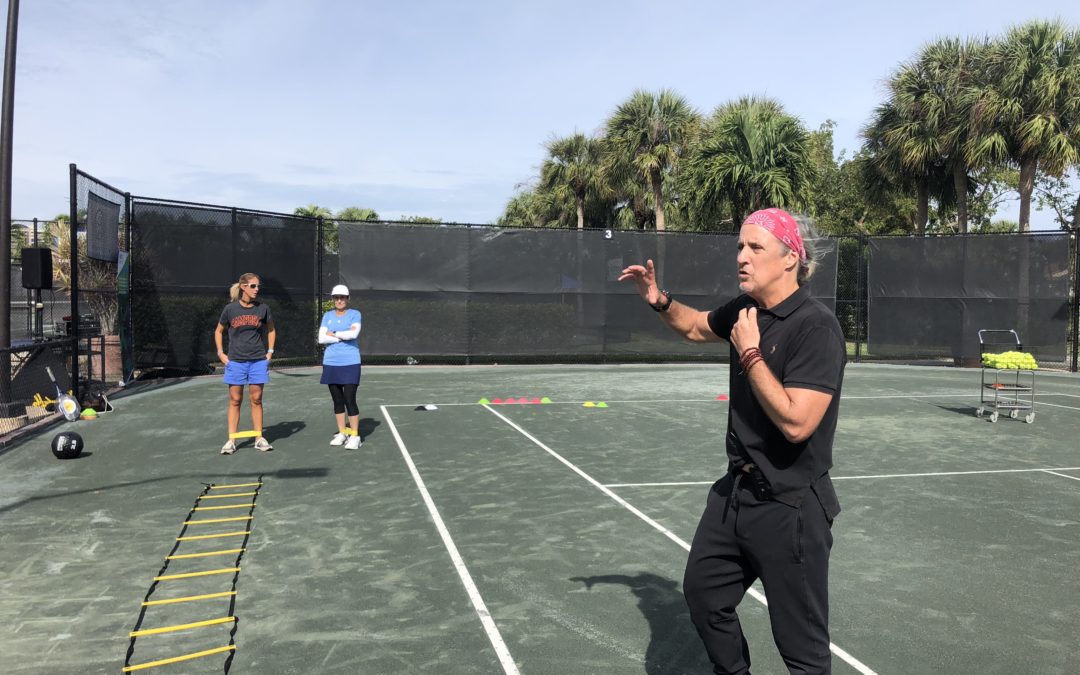When you think of tennis, the first analogy that comes to your mind is probably not ‘The Blind Men and the Elephant.’ However, if you ask physical therapist and strength and conditioning expert Ian Barstow, there is no parable more applicable to the sport.
Barstow uses ‘The Blind Men and the Elephant’ to explain why his unique training method, coined ‘You Improved 360,’ is the key to success in high performance tennis and beyond. The parable features a tale about four blind men who attempt to identify an unknown object (the elephant) they have encountered along their path.
According to Barstow, the parable goes something like this. “The first man grabs the elephant’s leg and says, ‘It’s a tree trunk.’ The second one grabs the tail and says, ‘You’re wrong, it’s a rope.’ The third one grabs the tusk and says, ‘No, no. It’s a spear.’ Then the fourth one grabs the belly and says, ‘No, it’s the roof of something.’ They are all right, but if you ask the four blind men about the elephant, they have no clue what the elephant looks like. They never took a step back and saw the big picture,” he explained.
Barstow began using the ‘You Improved 360’ method after working with upwards of 3,000 patients as a physical therapist. “As I got to know my patients more and more, I saw there was a much bigger picture to their well-being – looking at what they’re eating, their mindset, if they were exercising, if they were sleeping well and recovering well,” he said.
After getting married to former Olympic Athlete and professional tennis player Melinda Czink, Barstow began focusing much of his attention onto tennis players. “When I moved into tennis, I saw the athletes were hyper-focused. It was all about the tree trunk, or about the spear, or the tail. They never stepped back and saw the big picture of tennis,” he said.
“There are 17 biomarkers, in my opinion, of what athletes have to do to be successful and they must check all of these boxes. They are either skipping the gym, not sleeping enough, not eating right, or skipping writing down goals,” Barstow explained.
By combining the experience of working with his wife and the knowledge learned from obtaining a Master’s in Health Science from the University of Florida, Barstow gradually gained expertise in the many areas that encompass athletic success, which is why he has dedicated himself to the ‘You Improved 360’ method.
“My wife had no sponsorships, so I was the coach, the psychologist, the nutritionist, the physical therapist, the motivator. By having to do all those things, I saw the elephant. I saw what the elephant really looked like for high performance,” he recalled.
One of the cornerstones to Barstow’s ‘You Improved 360,’ is that prevention is the best medicine when it comes to patient optimization. In order to prevent injury down the line, he urges tennis players to seek well-trained experts in the field.
“Athletes have to hire someone who is qualified. There’s a lot of knowledge out there. If they hire a progressive physical therapist, the physical therapist knows the new knowledge,” explained Barstow. “There’s a lot of science to this profession. Physical therapists are now doctors. However, In tennis, there’s a lot of sales people out there. Sometimes it’s monkey see, monkey do.”
In addition to being a progressive physical therapist, the next step to success in the client-patient relationship is an emotional connection, particularly for female athletes.
“Female athletes need the big picture. Emotionally, you have to connect with them and understand what they want to buy into,” said Barstow. “Honestly, your patient will not only tell you their problem, but they will tell you the solution. You have to listen to them. That’s common sense, but unfortunately, common sense is not that common.”
For Barstow, getting to know the athlete is the key to building a beneficial patient-client relationship.
“I listen, and then I reaffirm. I know where the athlete is coming from, I know their story. You have to know their story to help them, and I’m not going to impose my story on them,” said Barstow. “My 360 approach for one athlete will be totally different for another athlete. I know that I need to listen to them and know where they’re coming from to understand their story. A cookie cutter approach or monkey see monkey do is not going to be beneficial.”
Barstow has dedicated his life to finding the bigger picture for each and every athlete that he works with, but he urges his own clients to find their own bigger picture in life.
“Live in the present and enjoy the moment. It’s a game, it’s not life. You’re not starving in Africa,” Barstow urged. It’s a beautiful game, one of the most beautiful games that is developing now. You’re privileged to play this game, live in the present and enjoy it.”
***
Follow Ian Barstow on Instagram – @HPO360

